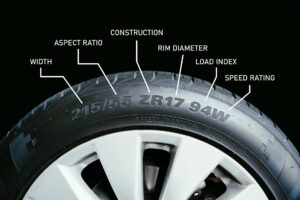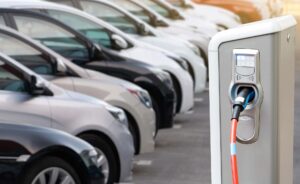Some states seem to hand out speeding tickets like candy at Halloween. If you’ve ever wondered what state has the most speeding tickets, you’re not alone. Whether it’s wide-open highways begging for a lead foot or congested streets where limits are strictly enforced, certain places take speeding violations to a whole new level. Let’s hit the road and find out where drivers are racking up fines the fastest!
Why Are Speeding Tickets So Common Across the US?
Speeding tickets are a common occurrence in the US due to a combination of cultural habits, road conditions, and enforcement practices. With sprawling highways, long commutes, and a car-centric lifestyle, drivers often push the speed limits, intentionally or not.
The presence of cities with the worst drivers also contributes to the need for stricter enforcement, as risky behavior on the road increases the likelihood of accidents and violations. Add in state-specific laws and varied speed limits, and it’s easy to see why speeding remains such a widespread issue.
Are Americans the Nation Of Speedsers With The Love for Fast Driving?
Americans have a deep-rooted love for speed, fueled by iconic cultural references and the freedom of the open road. From cruising down famous routes in the USA, like Route 66, to the influence of Fast and the Furious cars, speed has become synonymous with excitement and rebellion.
This obsession with fast driving often encourages drivers to push the limits, whether they’re behind the wheel of a sedan or daydreaming about supercars. Unfortunately, this need for speed frequently leads to more flashing lights in the rearview mirror.
How do State Laws and Speed Limits Play a Role?
Speeding laws and enforcement vary widely across the country, impacting how many tickets are issued. While some states impose strict penalties and keep drivers in check, others have looser enforcement, allowing drivers to test the boundaries. Speed limits also fluctuate based on road types, with highways encouraging faster driving compared to city streets.
Even the best car brakes can’t always save a driver from a ticket if they’re caught flying down an open road. State troopers and local law enforcement play a major role in ensuring drivers respect the rules, regardless of how tempting it is to emulate the fastest car in the world.
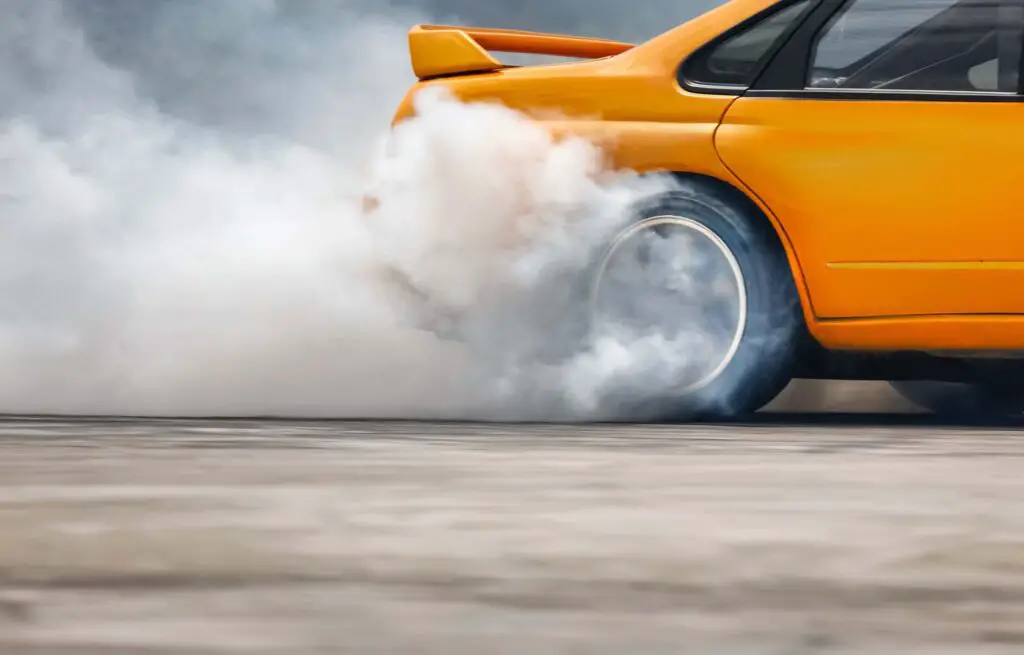
What State Has the Most Speeding Tickets?
Speeding tickets are a widespread issue across the United States, but some states stand out more than others. According to recent data, North Dakota tops the list, with 8.7% of drivers having a speeding ticket on record. This is significantly higher than the national average of 4.1%.
States like Wisconsin, Ohio, and Iowa closely follow, indicating that drivers in these regions are more likely to test their limits. Whether it’s cruising down open highways in cars perfect for road trips or navigating tricky rural roads, speeding remains a persistent problem.
The State Taking the Top Spot for Speeding Tickets
North Dakota, with its wide-open spaces and minimal traffic, leads the nation in speeding violations. A staggering 8.7% of drivers have at least one ticket on their record, more than double the national average. The allure of empty highways makes it tempting for drivers to go beyond legal speed limits, especially in vehicles equipped for adventure.
Many drivers opt for cars for city driving when navigating urban areas, but on North Dakota’s expansive roads, speed often becomes an afterthought. Combined with a low population density, drivers may feel encouraged to push the pedal further, increasing their risk of tickets.
Combined with a low population density, drivers may feel encouraged to push the pedal further, increasing their risk of tickets. Here is a list of most speeding tickets by state:
- North Dakota- 8.7% of drivers with a speeding ticket on record.
- Wisconsin- 7.8%
- Ohio-7.8%
- Iowa- 7.1%
- Idaho-7.1%
- Wyoming-6.8%
- South Dakota- 6.7%
- Virginia- 6.6%
- Utah-6.5%
- Oregon-6.4%
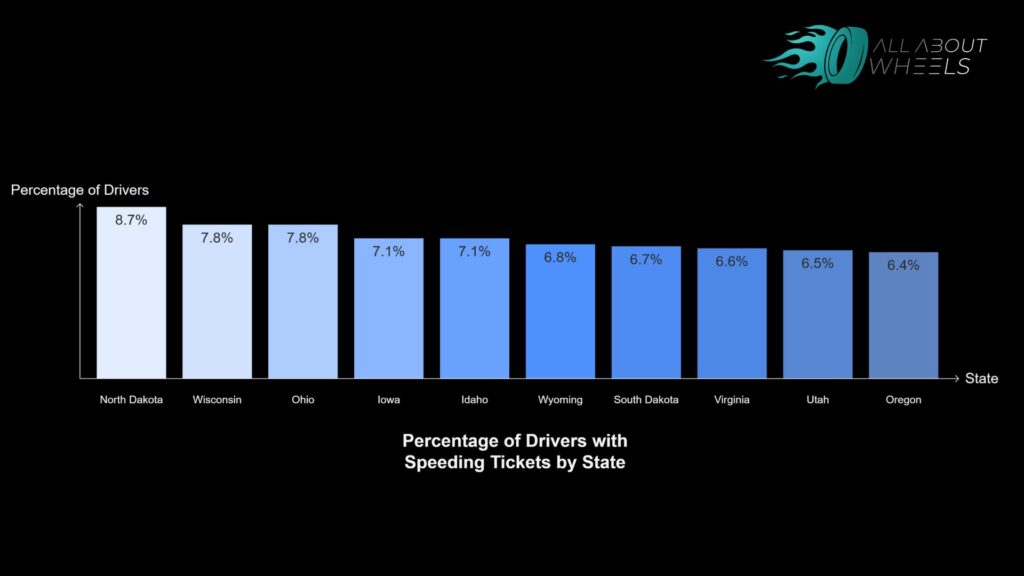
Why Does North Dakota Lead in Speeding Violations?
North Dakota’s leading position in speeding violations can be attributed to several factors. The state’s rural roads stretch for miles with little traffic, enticing drivers to pick up the pace. In these conditions, drivers often dream of pushing their vehicles to the limit, but reality catches up when strict enforcement comes into play.
Law enforcement, equipped with some of the fastest police cars, ensures that even the speediest drivers won’t get far before they’re caught. Speed traps are regularly used to monitor traffic, especially in areas where limits drop unexpectedly, making it easier for officers to issue citations.
Statistics: Approximately 34 million speeding tickets are issued annually in the United States, averaging about 93,000 tickets per day.
Another factor is the affordability of fines in North Dakota. For instance, a speeding violation of 15 mph over the limit can result in a relatively low fine of $15. While this may seem lenient, it encourages stricter enforcement, as officers frequently cite drivers to curb risky behavior. Combined with the ongoing evolution of cars, where modern vehicles are faster and quieter, it’s no surprise North Dakota drivers are caught speeding more often than in other states.
Additionally, there is a lack of traffic congestion, where crowded roads keep speeds in check. North Dakota’s long stretches of highway allow drivers to hit higher speeds, making them more likely to earn a citation.
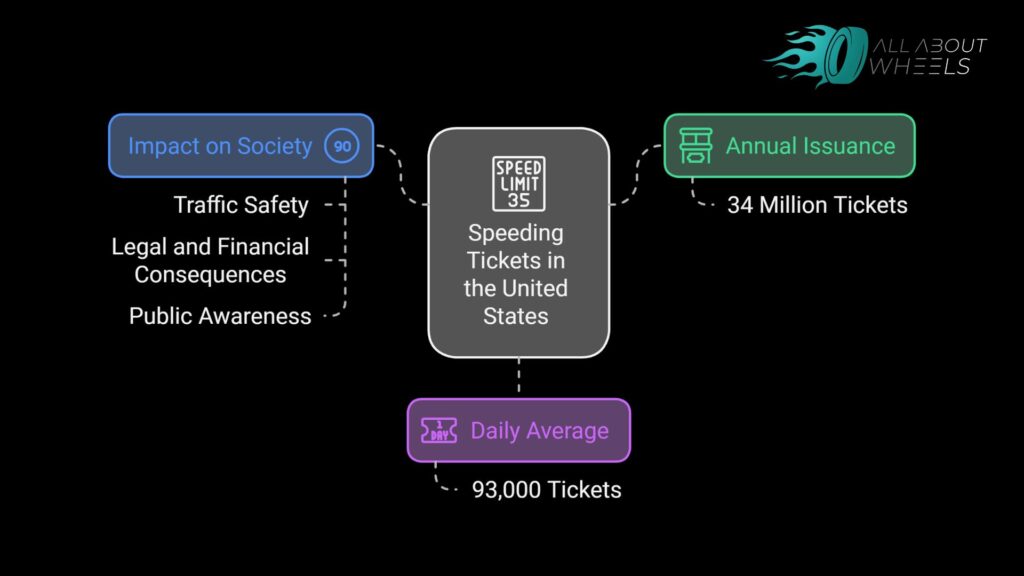
What Does This Mean for Drivers Across the US?
The prevalence of speeding tickets highlights a key takeaway: speeding enforcement and road conditions vary widely by state. While drivers in North Dakota face frequent tickets, others in urban states deal with the consequences of heavy traffic and cars for families jostling for space on congested streets.
Ultimately, speeding is a dangerous habit, as some of the worst car crashes in history show. Even the world’s safest car can’t fully protect drivers who fail to follow speed limits. For those who enjoy driving on open highways, it’s important to balance excitement with caution. After all, no road trip is worth a hefty fine or a safety risk.
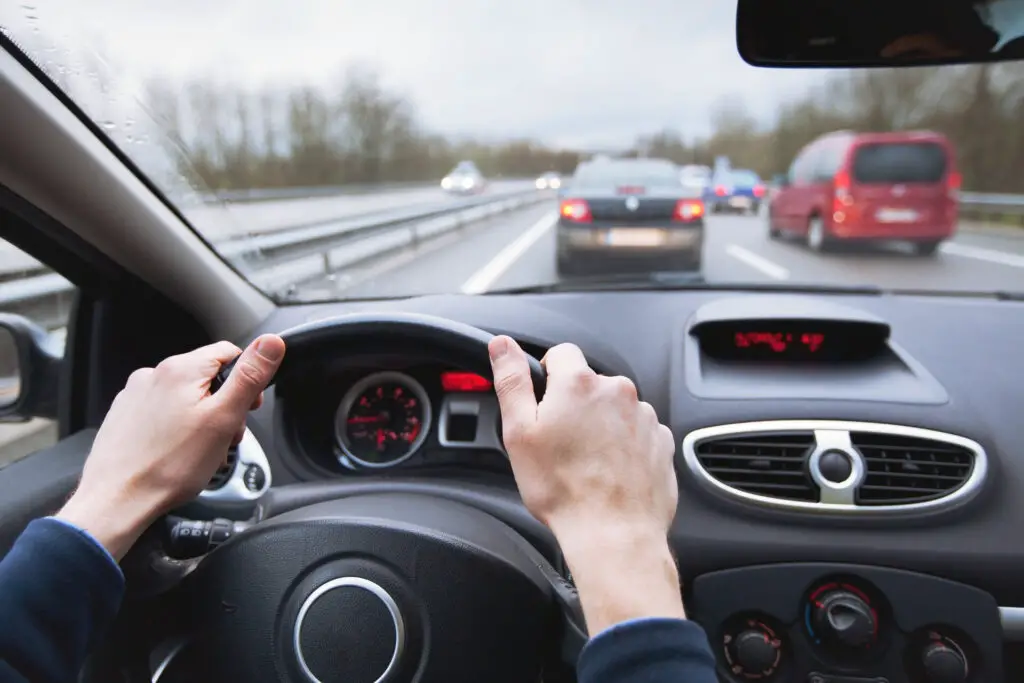
What are the States with the Lowest Speeding Ticket Rates?
Speeding tickets are a concern for drivers across the United States, but the likelihood of getting one depends on where you live and drive. States with vast rural roads and little traffic enforcement often see higher numbers of violations. At the same time, urban areas, where driving stress is more common due to congestion, naturally discourage high-speed driving.
For those managing car expenses, a speeding ticket can hit both their wallet and insurance premiums hard. Understanding these statistics highlights how geography and enforcement play major roles in driving habits across the country.
In states with open highways and lower population density, the temptation to speed is higher, and enforcement tends to be stricter. Leading the pack is North Dakota, where 8.93% of drivers have been cited for speeding. The long stretches of rural roads often make it feel like driving at night, where empty highways lull drivers into pressing the pedal further. Finally, did you know that in states like Virginia, law enforcement actively upholds drivers’ responsibilities, ensuring even small infractions result in citations?
The States with the Fewest Speeding Offenders
States with the lowest rates of speeding violations tend to have higher traffic congestion, stricter monitoring, or effective public awareness campaigns. Leading this list is Connecticut, where only 4.74% of drivers have a speeding violation. In states like this, congested roads and regular enforcement make speeding less feasible. Here are a few states with the fewest speeding offenders:
- Connecticut – 4.74% of drivers cited.
- New Jersey – Fewer tickets due to heavy traffic and urban environments.
- Rhode Island – Lower speeding rates are due to densely packed cities.
- Maine – High public awareness keeps speeds down.
- Massachusetts – While known for aggressive driving, speeding rates remain lower.
In urbanized states, drivers are more focused on navigating traffic and handling driving stress than testing their speed limits. These regions also benefit from consistent law enforcement and educational programs, helping keep roads safer and speeding violations to a minimum.
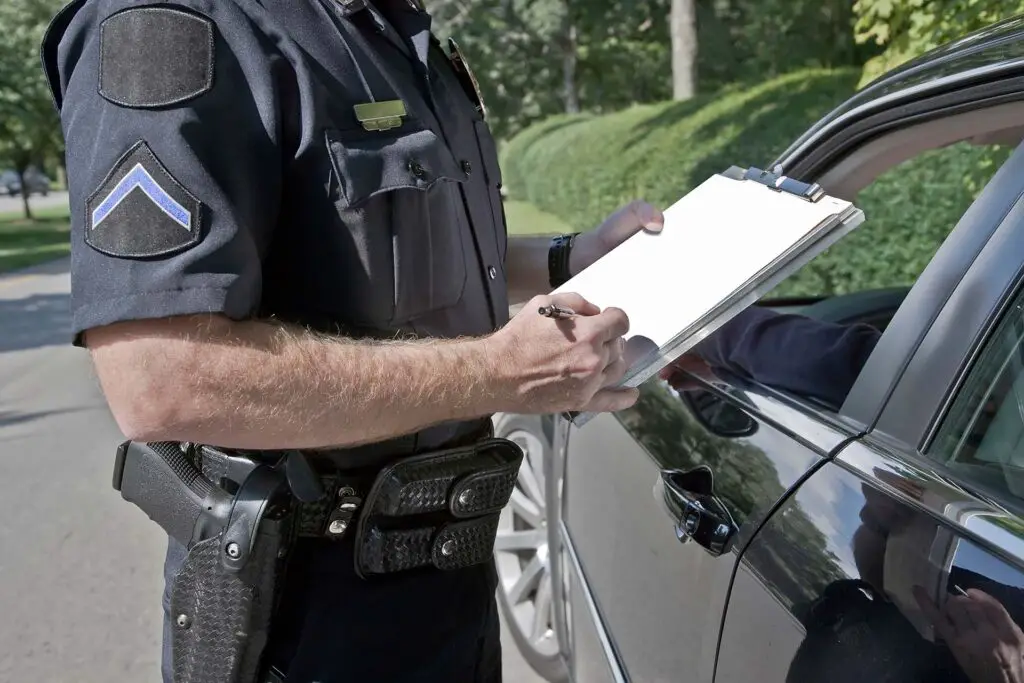
What Are the Consequences of Speeding Tickets?
Speeding tickets carries far-reaching consequences that go beyond a simple fine. From immediate costs to long-term impacts on driving records, the financial and practical effects can pile up quickly. For those already concerned with the cost of owning a car, a single speeding ticket can significantly add to their burden. Understanding these consequences helps drivers stay aware of their actions and make safer choices on the road.
Fines, Insurance Rates, and Driver Points
The most immediate consequence of a speeding ticket is the fine. Depending on the state and the severity of the violation, fines can range from minor fees to hundreds of dollars. Beyond this, drivers will likely see their insurance premiums increase.
Insurance companies view speeding as risky behavior, which can cause rates to spike for several years. Accumulating points on a driving record is another penalty, with too many points potentially leading to license suspension.
Long-Term Effects on Driving Records
Speeding tickets leave a lasting mark on your driving record, with consequences that can linger for years. Employers who require a clean driving history may hesitate to hire someone with multiple violations. Frequent tickets can also cause a driver’s license to be revoked in extreme cases, especially when combined with other offenses.
How Speeding Can Damage Your Car
Speeding doesn’t just affect your driving record. It also takes a toll on your car’s performance and lifespan. Driving at excessive speeds can wear down critical components like the engine, brakes, and suspension system.
For instance, speeding frequently reduces how long brakes last, forcing replacements sooner than expected. It can also strain the engine, resulting in bad fuel pump symptoms like sputtering or reduced power. Drivers might even notice white smoke from car exhaust, signaling potential issues with coolant leaks or engine damage. Add in speeding’s impact on fuel efficiency, and the costs of repair and maintenance quickly escalate.
For those who enjoy maintaining their cars, like tuning a carburetor or keeping an eye on oil filter costs, it is crucial. Speeding accelerates wear and tear, which means these routine repairs may come up more often and drive up costs. In the end, excessive speeding doesn’t just risk tickets. It jeopardizes your wallet and your car’s health.

The Importance of Following Road Rules
Speeding tickets serve as a clear reminder of why following traffic regulations matters. Respecting road signs and meanings and adhering to speed limits not only helps avoid fines and penalties but also keeps roads safer for everyone. By driving responsibly, you reduce the risk of accidents, minimize wear and tear on your car, and lower long-term car expenses. In the end, following the rules isn’t just about avoiding tickets. It’s about protecting yourself, your vehicle, and everyone sharing the road.



